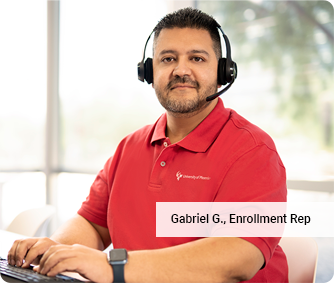
Online Master's in Elementary Education
Master of Arts in Education - Elementary Teacher Education
If you have an undergraduate or graduate degree in another field, the Master of Arts in Education - Elementary Education degree is your next step toward becoming an elementary school teacher. Develop advanced skills in classroom management and lesson planning for teaching elementary age children. Earn over 12 weeks of full-time clinical practice in a classroom setting that emphasizes the latest educational standards and helps prepare for certification.
Teaching licensure and placement
You won’t be in this alone. Our dedicated program support specialists help you navigate your application for teacher licensure and credentialing requirements. We can also help you identify a placement for your clinical experience and clinical practice.
Master of Elementary Education highlights
- 12 weeks of full-time clinical practice teaching in a classroom setting at a local school of your choice
- Receive 1:1 guidance and support to apply for elementary education licensure
Ignite Your Passion
Start when you're ready
Courses
Browse courses for your MAED
Complete your Master of Elementary Education degree with 15-16 core courses and one clinical practice teaching) courses to build both theory and first-hand experience. Two clinical practices courses required in select states.
Program Handbook: Teacher Education Handbook or California Teacher Handbook (CA residents only)
Look for this icon to see which skills you’ll learn in a course.
Completion requirements: 44-45 credits
You’ll need 44-45 credits to complete this Master of Arts in Education - Elementary Teacher Education. Your course schedule may vary based on previous experience, training or transferable credits.
MAED Teacher Licensure
Why is teacher licensure important?
Before becoming a teacher, you must demonstrate the skills and knowledge needed for effective classroom practice. Licensure provides professional and public assurance that educators have met state teaching standards and have demonstrated their readiness to teach.
Help with your program requirements
Education program specialists
Our dedicated education program specialists work with you 1:1 during your required hours of clinical experience (or more if required by your state) and a minimum of 12 weeks of clinical practice (or more in select states). They also help you navigate your state’s licensure requirements for teacher certification and help answer your questions along the way.
Review your state licensure requirements
The Master of Arts in Education - Elementary Education is offered in many states. Learn more about your state licensure requirements.
Master of Elementary Education enrollment requirements
Students with a bachelor’s degree in another initial teacher licensure program are not eligible for an MAED.
- You must have an undergraduate degree from an approved, college or university with institutional accreditation, or hold a comparable degree from a recognized institution outside the United States.
- You must have a cumulative GPA of 2.5 (on a 4.0 scale) as shown on the undergraduate degree posted transcript.
- Must successfully complete program objectives and apply concepts you learn in our courses.
College of Education Central
Find helpful resources for your elementary education degree on COE Central. Program handbooks provide robust information on topics such as professional expectations, clinical experiences, clinical practice, internships, edTPA and much more. Milestone roadmaps, technology and multimedia resources, and various toolkits are also available.
Program Purpose Statement
The Master of Arts in Education - Elementary Teacher Education is a graduate degree program intended for students with no prior teaching experience for initial teacher licensure. The program is designed for students who want to become multiple subject school teachers. Candidates for this program have already earned a bachelor's degree. The program includes a clinical component requiring field experiences and student teaching above and beyond program coursework. Requirements for licensure vary by state; please see your state's requirements. There may be additional qualifications and/or disqualifications applicable in order to work as a teacher with any local, state or federal entity.
Schedule
Your academic counselor will help you schedule your classes.
Why earn your MAED?
Continue your education with post-master certificates
Upon completing your MAED, you can pursue specialized certificates in education such as:
Earn career-relevant skills in weeks – not years.
Learning shouldn’t take years to put into practice. That’s why we’re empowering you to build career-relevant skills with every five- to six-week course.
We’ve worked with the labor market researcher Lightcast to identify in-demand skills for occupations and mapped those to our related associate, bachelor’s and master’s degree programs.
Tuition
Paying for school
Tuition is based on number of credit hours per course. Courses are typically 3 credits, but can range from 1-6 credits. Costs do not include savings opportunities like transfer credits and scholarships.
Master's cost per course
$1,815 / course

What affects the overall cost of my program?
Your full program cost can vary by:
- Savings opportunities. Get your degree faster and for less with eligible transfer credits, scholarships and work experience credits. Students with eligible credits and relevant experience can save up to $6,800 and 9 credits off their master’s degree.
- California Student Tuition Recovery Fund (STRF). If you’re a California resident or enrolled in a residency program, you must pay the state-imposed assessment for STRF which is currently $0 per $1,000 of institutional charges. The STRF assessment is nonrefundable.
- Additional estimated costs. The Master of Arts in Education/Elementary Teacher Education requires payment of additional charges to third parties for Certificate of Clearance Application, fingerprinting, TB testing and competency exams, which are listed in the estimated cost table below.
With our Tuition Guarantee, you pay one flat, affordable rate from the moment you enroll to the day you graduate from your program.
Earn your master’s degree faster and for less with eligible savings opportunities:
Additional estimated third-party costs:
Charge type
Cost
California Certificate of Clearance Application Fee
$52.65
Fingerprinting Fees
$116[1]
TB Testing
$139[2]
California Subject Examinations for Teachers (CSET) Exam
$297
Reading Instruction Competence Assessment (RICA) Exam
$171
Education Teachers Performance Assessment (edTPA)
$300
1 The amount shown for fingerprinting represents the estimated cost for fingerprints. The actual amount the student pays will depend on the agency the student uses for their school district.
2 The amount shown for TB testing represents the estimated cost for a TB test. The actual amount the student pays will depend on the agency the student uses for their school district.
Other ways to save on time and tuition
Because we believe everyone deserves an affordable education, we work hard to help our students achieve one. Here’s a few ways you can save time, save money and avoid starting from scratch.
Transfer credits
Your prior eligible college credits can lower your cost and help you graduate sooner. As a transfer-friendly university, we accept eligible credits from 5,000+ accredited institutions.
Employer tuition benefits
Are you employed? Check to see if your employer has an alliance agreement with us for education benefits. This can help you save money while gaining skills that could apply to your job.
Credit for life experience
We look at all your relevant experience, from parenting to past jobs, to help you get the college credits you deserve. For every 3 credits earned, shave 6 weeks off your degree.
Alumni savings
Are you a Phoenix alum? If so, you’re eligible for special tuition rates and can save up to $2,200 on a master’s degree. You can also save with an alumni scholarship.
Military savings
If you’re an active-duty service member in the U.S. Armed Forces or an eligible spouse or dependent, you may be eligible for a lower, military tuition rate and can save on tuition.
We can help you get started
Chat with an experienced advisor who can guide you through tuition, financial aid, scholarships, transfer credits and more.
- View 1
- View 2

Budget & borrow
How to pay for college
Paying for school can be intimidating, but we’re here to help you make sense of it. Our finance advisors can walk you through your options like federal financial aid and savings opportunities to minimize your debt. Plus, we can help you figure out your financial plan.
Careers & Outcomes
What can you do with an elementary education master’s degree?
A MAED can prepare you to be an:
Top skills learned in this program:
Classroom Management
Lesson Planning
Child Development
Differentiated Learning
Reflective Teaching Practice
Teaching
Professionalism
Leadership
Learning Strategies

Ready to get started?
Start your application for free or request additional information.
What you’ll learn
When you earn your master of elementary education degree, you’ll be equipped with a concrete set of skills you can apply on the job. You’ll learn how to:
- Design and implement effective instruction in the elementary classroom to positively impact student learning.
- Evaluate effective professional practice in an elementary classroom.
- Apply professional dispositions and ethics to instructional practices among the various communities in an elementary school setting.
- Evaluate educational principles and make use of various data sources necessary to differentiate instruction for the diverse learners in an elementary classroom.
- Create innovative strategies to improve student learning through the use current research and technology.
-2% Growth
According to the Bureau of Labor Statistics, job growth for kindergarten and elementary school teachers is projected to decline between 2024 and 2034.
The BLS Projected Growth for 2024-2034 is published by the US Bureau of Labor Statistics. This data reflects the BLS’ projections of national (not local) conditions. These data points are not specific to University of Phoenix students or graduates.
Admissions
Apply for free – no application fee, no obligation.
Starting your degree is a big decision — and we want you to feel great about it. That’s why we remove obstacles from your application.
- No cost to request prior transcripts
- No GMAT
- No essay required
How to enroll at University of Phoenix
Receive 1-on-1 support
You have a support team of real people you can lean on. And our academic counselors, who are with you every step of the way, have earned a 5-star rating from 90% of our surveyed students.[1] Start a conversation with an enrollment representative today.
[1] Transactional Survey, August 2021-22 (18,645 respondents)

Call or chat with us 7 days a week.

Gabriel G., Enrollment Rep
Receive 1-on-1 support
You have a support team of real people you can lean on. And our academic counselors, who are with you every step of the way, have earned a 5-star rating from 85% of our surveyed students.[1]
[1] Transactional Survey, September 2022-August 2023 (23,739 respondents)
Start a conversation with an enrollment representative today.
Call us at 844-937-8679 or chat with us 7 days a week.
Student Experience
An education that fits your busy life
Balancing family, work and school
Work toward your master’s program without giving up what matters most. Start your MAED degree year-round and take one class at a time.
Online learning
Your program gives you flexibility. Enroll in online classes and attend class whenever it fits your life, day or night. In-person clinical experiences are required in your home state.
Around-the-clock support and resources
You have a support team available up to 14 hours a day, 5 days a week.
Network with other education professionals through student organizations
Meet other education students while you study. You can even join Pi Lambada Theta International Society of Professional Association of Educators, an honor society for educators.

Faculty Spotlight
Education professionals dedicated to you
Our faculty are active teachers or leaders in K-12 schools. They are required to stay up to date in the field of education by keeping their teaching licensure current.
Industry Spotlight
Elementary education today
Depending on the school district, many experienced teachers may be expected to satisfy updated coursework upon renewal or learn to develop competency in new teaching developments and methods.
What is changing in elementary education
New approaches to teaching basic skills, such as reading and math, is already underway in many educational preparation programs. Many school districts across the United States have already adopted approaches such as the Science of Reading to improve reading scores among elementary school students.
Your MAED
A Master of Arts Elementary Education already includes innovative teaching methods such as the Science of Reading as part of what you learn. The master’s program prepares you with this and other contemporary or state-required methods for teaching as you enter the modern classroom as a professional elementary school teacher.

Mastering the classroom through direct experience
Learning in actual classroom settings
Theory only goes so far. That’s why our College of Education takes steps to ensure you are engaged in throughout the master’s program, so you can apply theories from your coursework to the real life elementary classroom. You get first-hand experience in diverse classroom settings, diverse student populations, and diverse teaching techniques using technologies that bring these experiences directly to you throughout the curriculum.
Accreditation
Accredited for 45+ years
Since 1978, University of Phoenix has maintained institutional accreditation by the Higher Learning Commission (HLC), hlcommission.org. Learn more about the value of University of Phoenix accreditation and how it benefits our students.
Frequently asked questions about the masters in elementary education degree
To enroll in a master’s of elementary education program, you must have:
- Completed an undergraduate degree or higher from a college or university with approved institutional accreditation with a cumulative GPA of 2.5 for all coursework.
- A minimum equivalent of three (3) years of full-time, post-high school professional work experience within the past ten years.
- Select states require coursework in some programs that you will earn prior to program admission.
Learn more about admission requirements
Students with a bachelor’s degree in another initial teacher licensure program are not eligible for an MAED.
You must pursue an application for state licensure in your home state to become an elementary school teacher. The Master of Arts in Education-Elementary Education program helps you meet requirements in many states, but not all. After completing your master’s program, you can pursue licensure in many states. Learn more about your state licensure requirements.
A master’s degree in elementary education prepares you for the role of elementary school teacher. A state licensure is required. Learn more about what you will need to meet the requirements for a teaching licensure in your state.
Students with a bachelor’s degree in another initial teacher licensure program are not eligible for an MAED. The Master of Arts in Education-Elementary Education degree is open to students who have earned an undergraduate degree or master’s degree in another field and wish to pursue a career in elementary school education.
To be eligible for a master’s degree program, you must meet the following criteria:
- You are a U.S. citizen or permanent resident, or have a valid visa if you’re living in the U.S.
- You have earned a bachelor's (or comparable undergraduate) degree from an approved, college or university with institutional accreditation, or hold a comparable degree from a recognized institution outside the United States
- You have a cumulative GPA of 2.5 (on a 4.0 scale) shown on a bachelor's (or comparable undergraduate) degree posted transcript
- You have not previously been expelled from a higher education institution
- You will complete all required forms for admission, as well as submit official test scores and transcripts from all colleges and universities you've attended
Learn more about admission requirements
No specific bachelor’s degree field is required to start a master’s degree. You must have a cumulative GPA of 2.5 (on a 4.0 scale) shown on a bachelor's (or comparable undergraduate) degree from an accredited institution. Learn about transferring credits.
Sign up for a University account to start the process. Complete your program application in about 20 minutes. Apply now
We have an open admissions policy that allows you to apply without standardized test scores, so GMAT/GRE test results are not required. What is required for admissions?
No, application to University of Phoenix is free. We strive to remove barriers for new students that might interrupt higher education goals, including fees for application. Explore costs and tuition.
At University of Phoenix virtual learning creates an engaging online experience with the flexibility that fits your lifestyle. Experience one-on-one connections with experienced faculty and collaboration with your classmates—all without the commute to class. Know more about student life.
As a university for working adults, we’ve created the flexibility to balance family, work and school. With a classroom that’s open 24/7 you can take one 5-6 week course at a time, allowing you to go to school on your schedule. Find out more about learning online.
Academic advisors are available 6 am to 7 pm, 5 days a week to provide guidance and support throughout your educational journey. Sign up to connect with advisors.
You can ask questions directly to your instructor about assignments and any other topics in your virtual classroom platform – Blackboard. You will also use Blackboard to collaborate with classmates, review assignments, receive feedback from your instructor, and stay on track with homework. Learn more about your virtual classroom.
Our online master’s programs can take anywhere from 12-37 months to complete depending on the degree or academic field you choose to pursue. Some competency-based programs may be completed sooner.
You may be able to shorten your path to graduation. Some master’s degrees have competency-based options to finish sooner. Other saving opportunities include transfer credits and credit for past work experience to help you finish your degree faster and for less. Learn more about master’s degree saving opportunities.
No, a University of Phoenix diploma does not indicate that the degree was earned online. The diploma only shows that the degree was earned in a specific field of study. We also offer continued opportunites after you graduate. Explore alumni benefits.
Every student at University of Phoenix has access to free career tools and resources. You can define your career goals, get help with your resumé, and prepare for your job search.
You can also use our career guides to explore on-the-job skills and opportunities for enhancement in your career of choice.
Educator/Principal licensure requirements vary by state. Candidates located in a state that does not provide a direct path to licensure will be required to obtain Arizona certification first, prior to seeking licensure in their home state as an out-of-state prepared teacher/principal candidate. Arizona certification requires candidates to pass all Arizona-specific licensure requirements, including any Arizona-specific exams (or home state equivalents if recognized by Arizona Department of Education.) After obtaining an Arizona teacher/principal certificate, candidates can then apply for licensure in their home state and may be required to complete additional testing and/or requirements at additional cost. Program requirements may change based upon your home state’s agency licensure requirements. Please visit the teacher licensure page or the principal licensure page for state specific requirements prior to reaching out to your state agency.
While widely available, not all programs are available to residents of all states. Please check with a University Enrollment Representative.




